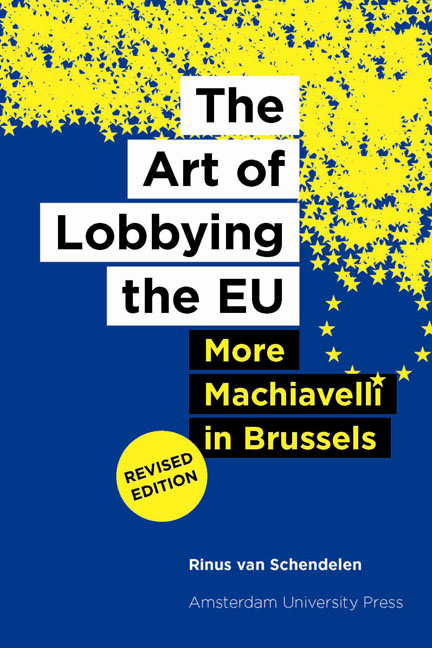Book contents
- Frontmatter
- Dedication
- Contents
- Detailed Contents
- Special Preface to the Fourth Edition: Ten Years’ Anniversary of this Book
- List of Figures
- List of Best Websites
- List of Abbreviations
- 1 The Europeanization of Public Affairs
- 2 The Playing-Field: EU Common Decision-Making
- 3 Pushing the Buttons of ‘Brussels’
- 4 Getting Grip on an EU Arena
- 5 Managing the Home Front
- 6 Managing the EU Fieldwork
- 7 The Limits of EU Public Affairs Management
- 8 Public Affairs, Lobbying and EU Democracy
- References
- Index
7 - The Limits of EU Public Affairs Management
Published online by Cambridge University Press: 10 December 2020
- Frontmatter
- Dedication
- Contents
- Detailed Contents
- Special Preface to the Fourth Edition: Ten Years’ Anniversary of this Book
- List of Figures
- List of Best Websites
- List of Abbreviations
- 1 The Europeanization of Public Affairs
- 2 The Playing-Field: EU Common Decision-Making
- 3 Pushing the Buttons of ‘Brussels’
- 4 Getting Grip on an EU Arena
- 5 Managing the Home Front
- 6 Managing the EU Fieldwork
- 7 The Limits of EU Public Affairs Management
- 8 Public Affairs, Lobbying and EU Democracy
- References
- Index
Summary
According to Machiavelli (Discorsi, book II-29), in any course of affairs many events happen and many misfortunes come about. Therefore, it is better to bend with fortune rather than to oppose it and to act in accordance with this truth from history rather than to neglect it. What are the implications of this for PA management in the EU?
I From Tantalus to SCARE
Our preceding chapters on the management of EU public affairs are full of buoyant spirits. The attractive flowers and trees of the EU playing-field seem to be within the reach of every interest group. Cultivating them may not be easy as this requires much homework and fieldwork but can be carried out if one is careful and energetic. Many groups, from governments to business and NGOs, hold the optimistic belief that, after their digging, fructifying and pruning, sooner or later a lot of flowers and fruits can be brought home as trophies. Many see room for planting even better varieties. Tantalus, in Greek mythology the hero unable to pick the grapes in Hades, would have loved to go to Brussels. In PAM, however, the sky is not the limit, but the players, the playing-field, the issues, the game, the audiences and all other features of a situation set the limits. Most of these limits are variables that can even be manipulated or managed to engineer a desired outcome, but only to some degree. The limit that is both most crucial and within reach, or manageable, is intelligence, being the summary variable of all preparatory homework regarding the three arenas of home front, stakeholders and officials and giving clues for the optimal support lobby for getting success. This summary variable is dependent on many factors that can pose limits to success and thus deserve closer attention here.
The various limits can be classified under different headings. One distinction is between limits that are endogenously linked to an interest group and those that exogenously come from outside. Another one differentiates between structural limits caused by patterned behaviour and cultural ones set by the individual and the collective minds. More concrete is the typology that is based on categories of the communication process, which underlies any process of influencing others.
- Type
- Chapter
- Information
- The Art of Lobbying the EUMore Machiavelli in Brussels (Revised Edition), pp. 285 - 324Publisher: Amsterdam University PressPrint publication year: 2013



